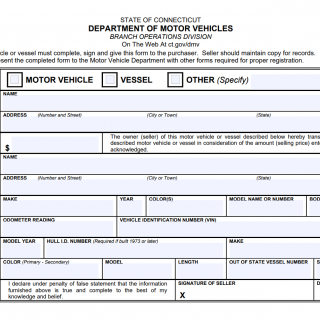Form H-31. Bill of Sale (Connecticut)
The Vehicle Bill of Sale (form H-31) is a legal document used in Connecticut for selling a vehicle privately. The form consists of several blocks, including the vehicle information block, buyer's information block, seller's information block, and transaction details block.
The vehicle information block includes details such as make, year, model, vehicle identification number (VIN), and odometer reading. The buyer's information block includes the buyer's name, address, and signature, while the seller's information block includes the seller's name, address, and signature.
The transaction details block includes the selling price and date sold. To ensure that the Vehicle Bill of Sale (form H-31) contains all the required information, both the buyer and seller must sign the form. Additionally, the form must be attached to the vehicle's registration and the Supplemental Assignment of Ownership (form Q-1).
Application examples for the Vehicle Bill of Sale (form H-31) include selling a vehicle privately in Connecticut. One of the strengths of this form is that it can be drafted by the seller as long as it contains all the required information. However, one of the weaknesses is that it may not be accepted in all situations, such as when registering a non-titled vehicle.
Alternative forms or analogues of the Vehicle Bill of Sale (form H-31) may include a vehicle purchase agreement or a sales contract. These forms may differ in the level of detail provided, specific terms and conditions of the sale, and legal requirements that must be met.
Once completed, the Vehicle Bill of Sale (form H-31) should be stored by both the buyer and the seller for their records. Although the form is not required to be notarized in Connecticut, it may be required in other states or situations.
In conclusion, the Vehicle Bill of Sale (form H-31) is an essential document for anyone selling a vehicle privately in Connecticut. By ensuring that it contains all the necessary information, this form can help prevent future disputes or legal issues and protect the interests of both parties involved in the transaction.

